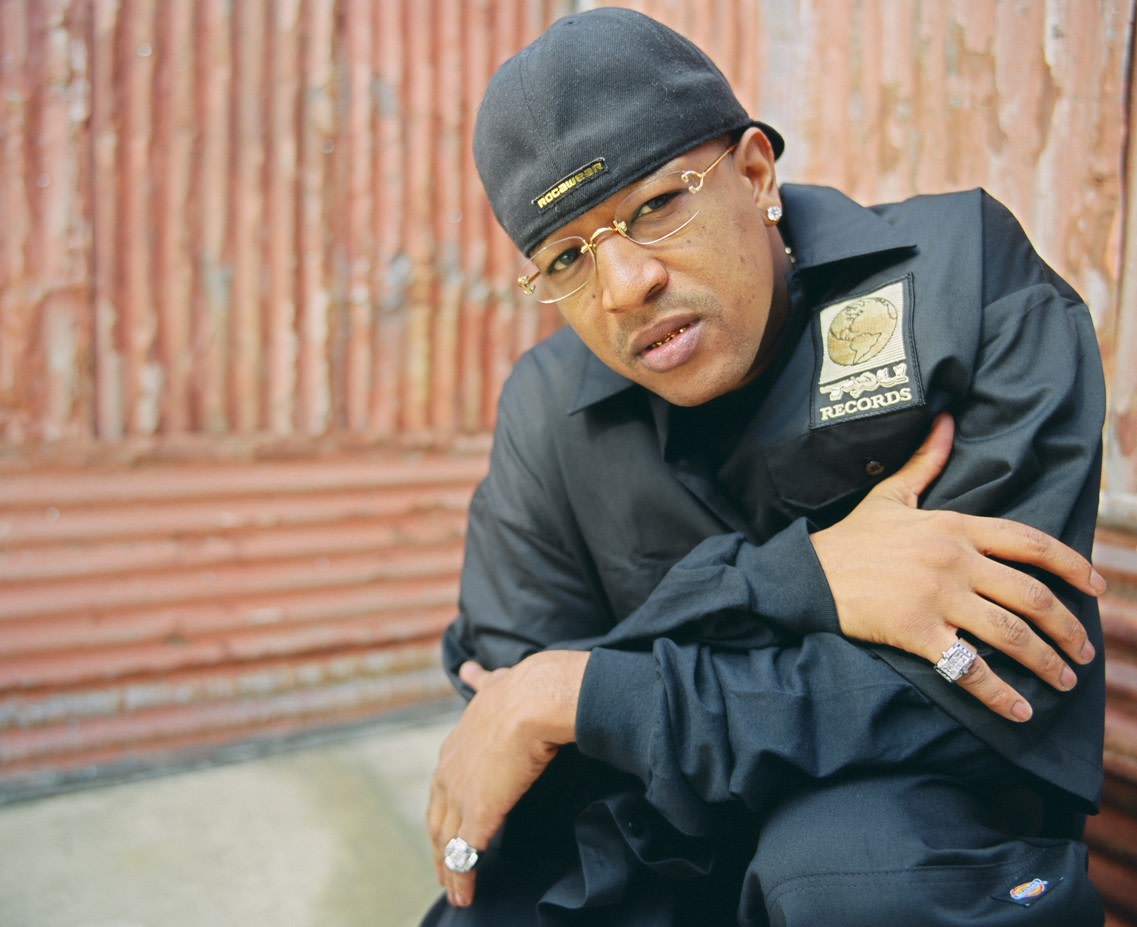 Corey Miller a.k.a. C-Murder. Photo via publicist.
Corey Miller a.k.a. C-Murder. Photo via publicist.
Corey Miller began the new year of 2002 on a tide of momentum. The Lousiana rapper known as C-Murder had been one of the hottest artists signed to No Limit Records, the hugely popular label founded by his brother Percy Miller a.k.a. Master P; now, Corey was stepping out with his own label, TRU Records. Outside of multiplatinum success with his No Limit-era group TRU, Miller's solo career was also flourishing. His 1998 debut Life Or Death went platinum a year after its release, with its 1999 follow-up Bossalinie going gold; the respectable initial chart success of “Down 4 My N’z,” a 1999 single from his third album Trapped in Crime, belied the classic status it enjoys today. In October of 2001, he released his first post-No Limit project, C-P-3.com. There were reasons for optimism everywhere he looked.
The ostensible trajectory of Miller’s life promised by these accomplishments disappeared forever on January 12, 2002, when a 16-year-old named Steven Thomas was shot and killed outside of a Louisiana venue called the Platinum Club. Miller was arrested and charged with the crime two days later; the resulting legal process that has been playing out since then has outraged criminal justice reform advocates while garnering little comparative media exposure.
The line from Miller’s arrest to his eventual conviction and life sentence has been anything but straight. Four years after his original conviction in September 2003, a retrial was announced after Judge Martha Sassone determined that the prosecution had withheld information on the criminal history of three witnesses from the defense. Miller’s second conviction came on August 10, 2009 through a 10-2 verdict — established by the state of Lousiana in an attempt to dilute the power of Black people on juries, these verdicts have since been declared unconstitutional by the Supreme Court, though this ruling does not apply retroactively to Miller’s case. One of the jury members who voted to convict would later claim she had been “brutally pressured” to change her vote to guilty by other jurors.
Miller’s conviction rested chiefly on the witness statements of two men, Darnell and Kenneth Jordan. Both men initially identified Miller as the shooter and later recanted, claiming that investigators had threatened them. Despite this, Miller has been unable to secure even a new hearing to look at the changing evidence; the most recent ruling handed down in November upholds a previous decision and dismisses the recantations as “suspect and not reliable” and declines to grant Miller any sort of relief. His claim of insufficient representation during the trial was also denied.
Still, there’s hope that Miller may return to court. Jane Hogan, Miller’s attorney, is continuing to push through the appeal process, which she says is ongoing. Over the phone, she spoke with The FADER about the flaws in Miller’s conviction, the most recent court ruling, and where they plan to go from here.
The FADER: After the decision that was handed down in November, what’s the status of Corey Miller’s legal strategy?
Jane Hogan: We have two appeals going at the moment, one in state court, one in federal court. Right now, we are appealing the denial of his habeas to the U.S. Fifth Circuit, and we'll see what happens with that. Louisiana enacted a new law in 2021 which allows for someone whose post-conviction is otherwise untimely the opportunity to file a post-conviction petition that is based on factual innocence. So we certainly filed that for Corey, and we raised all the evidence that supports his innocence, including an expert report. And that, of course, was shut down as well without a hearing.
And in doing so, the court relied upon its earlier decision, saying, "Well, I already said that the recantations here were not reliable, so there's no new evidence to..." That ruling is being appealed in the state intermediate appellate court at the moment.
The new ruling casts doubt on the two witnesses who recanted their initial statements claiming that they saw Corey Miller commit the murder. I'm wondering if you have a response to that, and if you can tell me how much of this ruling is weighted on laws that are specific to Louisiana versus actual problems with the witnesses.
Louisiana's law as it relates to criminal matters is identical to every other state. It's case law-based, like it would be in any other state. It's governed by the constitution and by state laws. The thing that frustrates me the most about Corey's case is that there's no evidence against him. The only evidence that the state presented at his second trial were the purported eyewitness statements of Darnell and Kenneth Jordan. They were arrested, held incommunicado, and forced to testify against Corey Miller at his second trial. And those two people have fully recanted and have stood by their recantations.
So it's one thing to say, "Recantations are suspect, let's bring these people into court, let's cross examine them. Let's test the veracity of their recantation against the veracity of what they stated at trial." [But] that has never happened. Corey's never been back to court since he was convicted and sentenced. So just the blanket assertion that recantations are suspicious just because they're recantations… if you look at those cases, all of those cases involve evidentiary hearings, where witnesses came to court, and they talked about their recantations. They talked about why they testified a certain way, why they're recanting. And the trial court and the appellate court made a finding that the recantation was suspicious. It hasn't happened here.
There’s been no entertaining of any of his claims... Corey has real claims for post-conviction relief, as meritorious as any claims that I’ve seen, in any case that I have.
Why is that?
He's been shut down. It's up to the court. What happens in a state post-conviction is, you put forth your claims. You say that Corey Miller's conviction violates the constitution because he's innocent, because the state withheld exculpatory evidence. You raise these claims in a filing [and] the state has the opportunity to file something in response called procedural objections, saying, "This should be denied because it's untimely." Or if there's no objections, the state files an answer. And the answer can be, "There's no merit to this. This is just bogus."
And then the court is supposed to look at what the state filed, look at what Corey's team filed, and make a determination. If there are disputed issues of fact that cannot be resolved upon the face of the pleadings [alone] — and the veracity of a recanted statement is a contested issue of fact — then post-conviction procedure dictates that in [such] cases, a hearing should be ordered.
In your experience, is it unusual for evidentiary hearings to be delayed or not permitted in cases like this?
I would say so. I'm an exclusively post-conviction lawyer. Basically, this is all I do. If you file something that has a disputed issue of fact, which is like, "My lawyer did a bad job," or, "The witnesses lied," or, "The state withheld the evidence." Those are all things that the defense is going to say happened and the state's going to say didn't happen, so that's a disputed issue of fact. And 9 times out of 10, evidentiary rate hearings are pretty routinely granted.
There's been no entertaining of any of his claims. It's not like we're reaching into the far atmosphere of law to create these creative arguments. Corey has real claims for post-conviction relief, as meritorious as any claims that I've seen, in any case that I have.
There's no physical evidence against him. The two people who testified against him and said, "We saw him do it," and their testimony was completely different to each other. We actually have an expert who has said that the manner in which they described the shooting is impossible, all of this. The only solid piece of physical evidence that was recovered was a chain was found near Steve's body. They had thought that that would contain Corey's DNA, so they tested it, [but] it didn't contain his DNA. We filed a motion to have it retested recently, that got denied. They don't want to give the case the attention that it deserves, and they don't want to give these claims the attention that they deserve.
They don't want to give the case the attention that it deserves, and they don’t want to give these claims the attention that they deserve.
Are cases like Corey Miller's common, where the only evidence tying them to a crime is disputed eyewitness testimony?
Oh, yeah. The Innocence Project of New Orleans's website has a whole chunk on false witness identification. The number one thing that leads to wrongful incarceration is false witness identification. And in this case, it's not a typical case of false identification in the sense that you saw something, but you were mistaken and you picked the wrong guy out of the lineup. This is a case that from the get-go, the Jefferson Parish Sheriff's Office was zeroed in on Corey Miller because he was present at the club that night. And so all of their investigations led in that sole direction. They weren't looking for who actually shot Steve, and that's a real tragedy here. They were just lasered in on Corey.
If tomorrow, a judge announced that there was going to be an evidentiary hearing in this case, do you think that would materially improve Corey Miller's prospects?
100%. That's all we've ever wanted. It's our burden to show that there were constitutional violations, and we've been prepared to show that, but we've just never been afforded the opportunity to bring those claims in a hearing.
This interview has been edited and condensed for clarity
